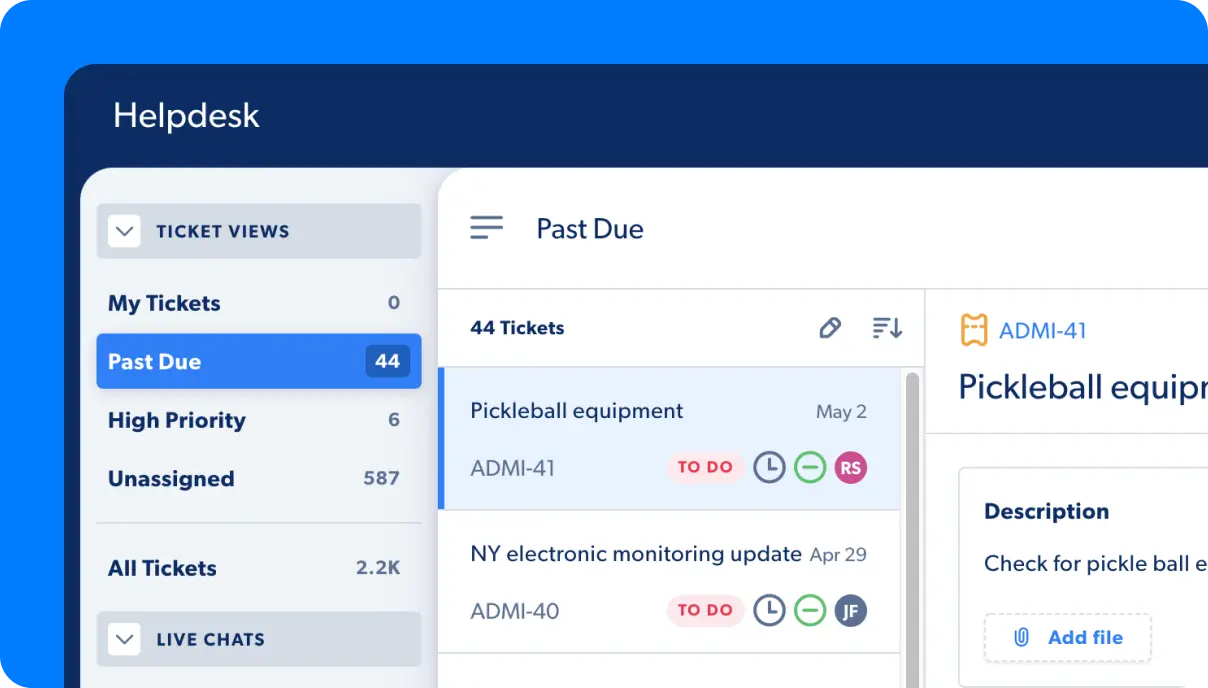In this fast-paced business world, finding the most suitable solutions to streamline processes and improve the employee experience is a top priority. That’s where a private knowledge base comes in — a powerful tool that can revolutionize how your organization handles internal support.
In this article, we’ll explore everything you need to know about private knowledge bases and how to set one up for your business. So, let’s dive in and unlock the potential of a private knowledge base together!
What is a private knowledge base?

At its core, a private knowledge base is a centralized repository of information designed to support your organization’s needs. It’s like having your very own treasure chest of insights, solutions, and best practices, tailored specifically to your business.
Instead of struggling with scattered information or relying on tribal knowledge, a private knowledge base ensures that your valuable resources are organized, easily accessible, and available only to authorized individuals within your organization.
Say goodbye to time-consuming searches and hello to efficiency!
How to Set Up a Private Knowledge Base For Your Business (A step by step guide)
Getting started implementing a private knowledge base can be tricky.

Here are some detailed steps that you can follow:
Step 1: Identify your needs and goals
The first step in setting up a private knowledge base is to understand your organization’s pain points and goals. Consider these questions:
- What are the challenges you’re facing in your internal support processes?
- What do you hope to achieve with a private knowledge base?
- What FAQs are asked consistently?
By identifying your needs and goals, you can lay a solid foundation for your knowledge-base.
Step 2: Choose the right platform
Once you clearly understand your needs, it’s time to choose the right platform for your private knowledge base. Look for a solution that offers customization options and allows you to control access levels. Security is paramount, so ensure the platform provides robust measures to keep your information safe and confidential.
We list a few great options near the end of the article. Our favorite (no surprise) is Capacity. More on that later!

Streamline Complex Processes Instantly
Capacity’s AI and automation technology can help:
- Answer FAQs anytime, anywhere
- Find relevant documents within seconds
- Give surveys and collect feedback
Step 3: Organize your content
Now it’s time to roll up your sleeves and organize your content. Break down complex topics into bite-sized, easily digestible pieces of information. Keep your sentences short and your explanations concise. The goal is to empower your employees to find the answers they need quickly and independently.
Step 4: Establish a culture of contribution
A private knowledge base thrives on collaboration and contribution. Encourage your employees to share their expertise and insights actively, making the knowledge base a dynamic and evolving resource.
This enriches the repository and fosters a sense of ownership and engagement among your team members.
Step 5: Implement effective search functionality
Invest in a platform that offers robust search functionality to ensure the efficiency of your knowledge base. An intuitive search algorithm and effective tagging system can make a world of difference in helping users find the information they need, saving time and frustration.
Step 6: Regularly update and maintain
Lastly, remember that a private knowledge base is not a one-time endeavor. Commit to regularly updating and maintaining your knowledge base to keep the information accurate, relevant, and aligned with your evolving business needs. This ongoing effort will ensure that your private knowledge base remains a valuable asset for your organization.
By following these steps, you’ll be well on your way to harnessing the power of a private knowledge base. Streamlining internal support processes and improving the employee experience will become a reality for your business.
Internal knowledge base best practices
To make the most of your private knowledge base, it’s essential to follow some best practices.

Here are a few tips to ensure your knowledge base is effective and valuable:
Regularly review and update
Set aside dedicated time to review and update the content in your knowledge base. This will ensure that the information remains accurate, relevant, and current. Don’t let outdated or incorrect information hinder your employees’ ability to find the answers they need.
Encourage feedback and suggestions
Foster a continuous improvement culture by actively seeking employee feedback and suggestions. They are on the front lines and may have valuable insights to enhance the knowledge base’s usability and content. Embrace their feedback and make iterative improvements to provide the best possible support.
Promote accessibility and ease of use
Ensure your knowledge base is easily accessible to all employees, regardless of their role or location. Consider using a user-friendly interface and intuitive navigation to make it effortless for users to find the information they need. The more accessible and user-friendly your knowledge base is, the more likely it will be utilized effectively.
Make sure the knowledge base platform you select has role management capabilities. Organization is key to an internal knowledge base.
Best private knowledge base platforms
When it comes to choosing a private knowledge base platform, there are several excellent options available. Here are some of the best private knowledge base platforms:
Capacity
Capacity is an AI-powered support automation platform that revolutionizes how businesses handle support and streamline processes. With its low-code platform and conversational AI interface, Capacity empowers teams to answer FAQs, automate tasks, and build solutions to tackle any business challenge.
Key Features:
Here are three main features of Capacity:
- A comprehensive helpdesk solution, enabling teams to answer more than 90% of frequently asked questions. By automating responses to common queries, businesses can reduce the number of tickets in their support team’s queue and improve customer satisfaction.
- Low-code workflows automate monotonous processes and tasks. By using this feature, cross-functional teams can increase productivity and efficiency. Workflows can be customized without extensive coding knowledge, allowing teams to streamline operations effectively.
- A user-friendly knowledge base, a suite of app integrations, and a conversational interface. This empowers employees by providing access to relevant information and facilitating seamless collaboration across different platforms and systems.

Automate Your Work
Capacity’s enterprise AI chatbot can help:
- Answer FAQs anytime, anywhere
- Find relevant documents within seconds
- Give surveys and collect feedback
KnowledgeHub
KnowledgeHub is a comprehensive knowledge management solution that offers robust features for organizing, sharing, and searching information. Its powerful search functionality, customizable templates, and seamless integration capabilities make it a popular choice for businesses looking to streamline their internal support processes.
Key Features
- Advanced search capabilities with intelligent algorithms for quick and accurate results.
- Customizable templates for easy content creation and organization.
- Integration with popular collaboration tools and platforms for seamless workflow integration.
Document360
Document360 is a knowledge base platform designed explicitly for SaaS businesses. It focuses on providing a user-friendly interface, advanced analytics, and powerful collaboration features. With Document360, SaaS companies can effectively document their product features, FAQs, and user guides, making it a go-to solution for customer support teams.
Key Features
- Markdown editor for easy content creation and formatting.
- In-depth analytics to track knowledge base usage and identify areas for improvement.
- Collaborative authoring and approval workflow to streamline content creation and updates.
Confluence
Confluence, developed by Atlassian, is a widely popular knowledge base platform known for its versatility and integration capabilities. It offers a collaborative environment for creating and sharing knowledge articles, making it ideal for teams looking to centralize information and foster collaboration.
Key Features
- Team collaboration features like inline comments and @mentions for seamless communication.
- Integration with other Atlassian products, such as Jira and Trello, for enhanced project management.
- Robust permission settings to control access and ensure information security.
Tettra
Tettra is a knowledge base platform explicitly designed for internal company knowledge. It focuses on simplicity and ease of use, allowing businesses to set up and organize their internal documentation quickly. With Tettra, teams can easily create, share, and find information, improving internal communication and collaboration.
Key Features
- Intuitive editor with real-time collaboration for seamless content creation.
- Slack integration for easy sharing and access to knowledge base articles within the team communication channels.
- Customizable categories and tags for efficient organization and retrieval of information.
Helpjuice
Helpjuice is a robust knowledge base platform that provides an exceptional search experience. It offers advanced search functionality, a user-friendly interface, and customization options to match your brand’s look and feel. Helpjuice is particularly suitable for organizations with extensive knowledge base content and a focus on delivering accurate search results.
Key Features
- Advanced search algorithms with features like spell check and synonyms for improved search accuracy.
- Customizable branding and design options to align the knowledge base with your company’s visual identity.
- Built-in analytics to track user behavior and identify popular search queries or content gaps.
These platforms offer a range of features and specialties, allowing you to choose the one that best suits your organization’s needs. Evaluate their capabilities, consider your requirements, and select the private knowledge base platform that aligns with your goals and empowers your internal support processes.
See why 1200+ companies choose Capacity for their knowledge base solution. Try it for free today!













































